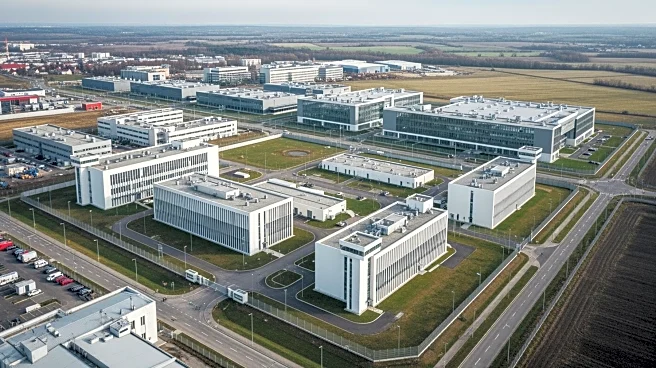What's Happening?
Ryder System, Inc., a leading logistics and transportation company, is enhancing its logistics network across the United States, Canada, and Mexico. The company operates three main business segments: Supply
Chain Solutions, Dedicated Transportation Solutions, and Fleet Management Solutions. Ryder's logistics services include warehouse management, distribution, transportation management, and last-mile delivery. The company manages approximately 250,000 vehicles and operates around 760 maintenance locations. Ryder's logistics network supports cross-border freight movements, with significant operations between the U.S., Canada, and Mexico.
Why It's Important?
Ryder's extensive logistics network is crucial for supporting the supply chains of major consumer brands, including top food and beverage companies in the U.S. The company's ability to manage complex logistics operations across North America is vital for ensuring the timely delivery of goods. This network is particularly important for industries that rely on efficient supply chain management, such as retail and automotive. Ryder's logistics capabilities help businesses navigate challenges such as cross-border trade and fluctuating demand, providing stability and reliability in their operations.
What's Next?
Ryder is likely to continue expanding its logistics network and enhancing its service offerings to meet the evolving needs of its clients. The company may invest in technology and infrastructure to improve efficiency and reduce costs. As cross-border trade remains a key focus, Ryder's logistics solutions will be essential for businesses looking to optimize their supply chains. Stakeholders such as manufacturers and retailers will be watching Ryder's developments closely to assess potential impacts on their operations.
Beyond the Headlines
Ryder's logistics operations highlight broader trends in the industry, including the increasing importance of technology and data analytics in supply chain management. As companies seek to improve efficiency and reduce costs, innovations such as automated warehousing and real-time tracking may become more prevalent. Ryder's approach to logistics could influence industry standards and practices, encouraging other companies to adopt similar strategies.









